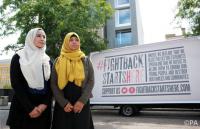-
U.K. government should consider extremism strategy: Parliamentary panel

The Joint Select Committee on Human Rights of the British Parliament said the government should reconsider its counter extremism strategy, use the existing extensive legal framework for dealing with people who promote violence, and introduce new legislation only if it can demonstrate a significant gap. The committee’s report concludes that while there is agreement that tackling terrorism is a priority, there is no agreement about how to combat extremism, particularly since the government is also under a duty to uphold the democratic and human rights which terrorists so often aim to extinguish.
-
-
New tool keeps track of violent groups without having to geolocate the tweets
Researchers have developed new sentiment analysis algorithms which can monitor the social network Twitter in search of violent groups. The system analyzes both the messages these individuals share and how their relationships develop. The police and other law enforcement agencies could use the tool to detect critical points, threats, and areas with concentrations of potentially dangerous people.
-
-
Ex-Treasury official: Hezbollah has turned Lebanese villages into missile silos
Hezbollah has embedded its rocket arsenal in villages across Lebanon, ensuring that any Israeli strike on the Iran-backed terrorist group’s military assets will lead to mass civilian casualties, a former Treasury official said on Monday. Hezbollah has turned the Shiite villages “into essentially missile silos,” Jonathan Schanzer said. “What you have is rockets placed under homes, schools, apartment buildings, etc., so when the Israelis need to try to strike these weapons before they’re launched, it will potentially lead to mass casualties.”
-
-
Climate disasters increase risk of armed conflict in multi-ethnic countries
Climate disasters like heat-waves or droughts enhance the risk of armed conflicts in countries with high ethnic diversity, scientists found. Each conflict is certainly the result of a complex and specific mix of factors, but it turns out that the outbreak of violence in ethnically fractionalized countries is often linked to natural disasters that may fuel smoldering social tensions.
-
-
Report: Next war with Hezbollah could cause “thousands of civilian deaths” in Israel

Israeli officials believe that a future war with Hezbollah, with its advanced Iranian-supplied rocket arsenal, could lead to “thousands of civilian deaths,” according to a new study. Hezbollah is now believed by Israel to possess about 150,000 rockets, which exceeds the combined arsenals of all non-U.S. NATO countries and is ten times larger than its arsenal before the 2006 war.
-
-
There is no manual on how to defeat ISIS – “we’re writing it”: John Kerry
Speaking Thursday at the opening of a 3-day meeting in Washington, D.C. of thirty countries currently engaged in fighting ISIS, Secretary of States Joh Kerry said, “We are engaged in an historic effort. Nothing like this coalition has ever before been assembled. And we’re not following a manual on antiterrorist coalition-building, we’re writing it.”
-
-
Brazil's police arrest 10 ISIS sympathizers suspected of Olympics terror plot

With two weeks to go to the opening of the Olympic Games in Brazil, the Brazilian police have arrested ten alleged ISIS sympathizers in the states of São Paulo and Parana on suspicion of planning acts of terrorism during the games. Two other suspects are still at large. Brazil’s intelligence agency ABIN has worked with foreign intelligence services to provide the information that led to the arrests.
-
-
Nice terrorist had accomplices, was planning the attack for a year
Mohamed Lahouaiej Bouhlel, the truck driver who killed eighty-five people in Nice on Bastille Day, had accomplices – and he had been planning his attack for months, the prosecutor leading the investigation said. Prosecutor Francois Molins said five suspects were facing terrorism charges for their alleged roles in helping the driver.
-
-
Baton Rouge gunman was a member of black “sovereign citizen” group

Gavin Long, the 29-year old former Marine who on Saturday killed three Baton Rouge police officers, was a member of a black antigovernment sovereign citizen group whose members believe they are indigenous to the United States and beyond the reach of the federal government. Members of the Washitaw Nation believe that they are descendants of black people who occupied the North American continent tens of thousands of years before white Europeans arrived, and, therefore, they fall outside federal authority.
-
-
Indonesian security forces kill country's most wanted Islamist militant
Abu Wardah Santoso, Indonesia’s most wanted Islamist militant, was killed in a shootout with security forces. Santoso, who was the leader of the East Indonesia Mujahideen militant group which, in 2014, claimed allegiance to ISIS, had eluded capture for more than five years.
-
-
Updated 2015 Global Terrorism Database release
The National Consortium for the Study of Terrorism and Responses to Terrorism (START) has released an update to its Global Terrorism Database (GTD), an open-source database including information on terrorist attacks that took place around the world between 1970 and 2015. Among the findings: The total number of terrorist attacks and total deaths due to terrorist attacks worldwide decreased by 12 percent in 2015, compared to 2014. This was largely due to fewer attacks and deaths in Iraq, Pakistan, and Nigeria. This represents the first decline in total terrorist attacks and deaths worldwide since 2009.
-
-
U.K. reviews security measures for large outdoor events
Amber Rudd, the new British home secretary, told the House of Commons that she has ordered a full review of the security measures taken to protect large outdoor events such as festivals and other public gatherings. The review comes in the wake of the attack in Nice on revelers celebrating Bastille Day. Rudd said that additional security measures will be put in place, including what is known as the “national barrier asset” when police assess that there is a risk of vehicle attacks.
-
-
Brazilian Jihadist group pledges allegiance to ISIS on eve of Olympic Games
A Brazilian Jihadist group called Ansar al-Khilafah, has pledged allegiance to ISIS less than a month before the opening of the Olympic Games in Rio de Janeiro. It is the first pledge of allegiance to ISIS to come from South America. Portuguese and Spanish versions of ISIS’s Nashir have also been launched on the encrypted Telegram messaging app.
-
-
Shooter motivated by 1960s-era Black Nationalism

Gavin long, 29, who shot and killed three policemen in Baton Rouge before being fatally shot by the police, appears to have been motivated by 1960s-era Black Nationalism, which called on African Americans to take a strong, even violent, stance against mistreatment by authorities. Long left a long trail of on-line material, both postings and videos. In another video, referring to Native Americans, Long said, “When they were extincted [sic] by the same people that run this country, my question to you, just something you can think about: At what point should they have stood up?”
-
-
Was the Nice attacker really an IS "lone wolf"?
The Bastille Day terror attack on the Promenade des Anglais in Nice has been claimed by the Islamic State Group – sort of. With no clear connection to Jihadi groups (and merely a record as a petty criminal), French officials are trying to ascertain whether Bouhlel was a lone actor terrorist or a mentally ill person with whom IS is opportunistically associating. The idea that a mass casualty perpetrator is likely to be suffering from mental illness is consistent with the research on lone actors. My research on suicide terrorism has demonstrated that affiliation with a group is quite different from the research of Criminal Justice professor Adam Lankford of the University of Alabama who insists that many terrorists are suicidal and not sacrificing themselves for a greater cause or for some underlying altruistic motivation of self-sacrifice. The implications for policy and the potential for backlash from terrorists and counter terrorists vary greatly depending on which scenario ends up being accurate for Bouhlel, whether he was in fact radicalized or possible mentally ill matters.
-
More headlines
The long view
Patriots’ Day: How Far-Right Groups Hijack History and Patriotic Symbols to Advance Their Cause, According to an Expert on Extremism
Extremist groups have attempted to change the meaning of freedom and liberty embedded in Patriots’ Day — a commemoration of the battles of Lexington and Concord – to serve their far-right rhetoric, recruitment, and radicalization. Understanding how patriotic symbols can be exploited offers important insights into how historical narratives may be manipulated, potentially leading to harmful consequences in American society.
Luigi Mangione and the Making of a ‘Terrorist’
Discretion is crucial to the American tradition of criminal law, Jacob Ware and Ania Zolyniak write, noting that “lawmakers enact broader statutes to empower prosecutors to pursue justice while entrusting that they will stay within the confines of their authority and screen out the inevitable “absurd” cases that may arise.” Discretion is also vital to maintaining the legitimacy of the legal system. In the prosecution’s case against Luigi Mangione, they charge, “That discretion was abused.”
“Tulsi Gabbard as US Intelligence Chief Would Undermine Efforts Against the Spread of Chemical and Biological Weapons”: Expert
The Senate, along party lines, last week confirmed Tulsi Gabbard as Director of National intelligence. One expert on biological and chemical weapons says that Gabbard’s “longstanding history of parroting Russian propaganda talking points, unfounded claims about Syria’s use of chemical weapons, and conspiracy theories all in efforts to undermine the quality of the community she now leads” make her confirmation a “national security malpractice.”
